Welcome
....to JusticeGhana Group

JusticeGhana is a Non-Governmental [and-not-for- profit] Organization (NGO) with a strong belief in Justice, Security and Progress....” More Details
Nigerian girls' abduction shakes Ghanaian women into Mothers' Day protest
- Details
- Category: DateLines
- Created on Sunday, 11 May 2014 00:00
- Hits: 4016
 Nigerian girls' abduction shakes Ghanaian women into Mothers' Day protest
Nigerian girls' abduction shakes Ghanaian women into Mothers' Day protest
“How can we celebrate mothers' day when our daughters are missing,” was a popular refrain from the protesters as Ghanaian women show solidarity to the crisis of 230 missing Nigeria teenage girls.
Hundreds of well-meaning women and men from across the length and breadth of the country have matched to the Nigerian High Commissioners Residence to present a petition on Sunday.
The women believe it is time the Nigerian Government puts in more effort to finding the more than two hundred abducted young girls.
At least 200 school girls remain missing and the government's slow response to the abduction by terrorist group, Boko Haram, has led to protests across Nigeria.
Nigeria's military denied Amnesty International reports that it had advance warning of the attack on Chibok in Borno State.
The girls remain unaccounted for.
Solidarity for the girls has been global. It has been condemned globally including US first lady Michelle Obama.
Here in Ghana, several Ghanaian women have inched up African support this Sunday morning. 2012 Running mate of the Progressive People’s Party Eva Lokko who was part of the demonstrations in Accra said this year’s mother’s day is not worth celebrating following the abduction of the girls.
Eva Lokko said the abduction of the 230 girls in Nigeria dealt a blow to parents, adding this year’s mother’s season is one that brings heaviness to the heart.
She asked that the girls are brought back home by making a legitimate demand since children are a gift and it is essential the world go at length to finding the girls.
Source: Myjoyonline.com
Goodluck Jonathan: A powerless president
- Details
- Category: DateLines
- Created on Thursday, 08 May 2014 00:00
- Hits: 10718
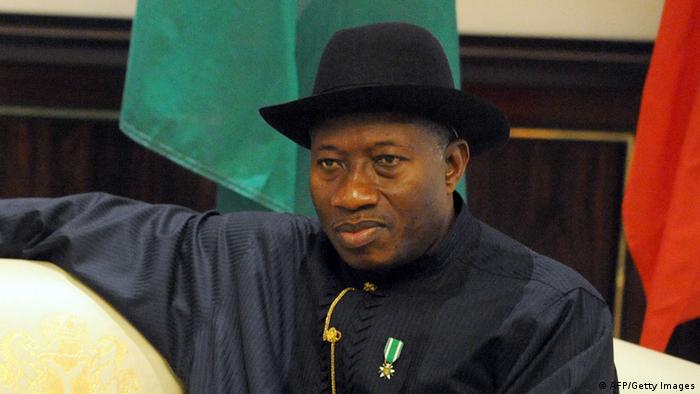 Goodluck Jonathan: A powerless president
Goodluck Jonathan: A powerless president
A wave of violence is spreading over Nigeria. Almost daily, the terrorist group Boko Haram is involved in massacres, kidnappings and bombings. Does President Goodluck Jonathan have control of the country?
Never before has the division within Nigeria been as obvious as it is now. The prosperous south which helped make the country the leading economic nation within Africa, has been eclipsed by the north which is sinking further and further into terror and violence.
Just days before President Goodluck Jonathan opens the World Economic Forum to high-ranking visitors from around the world in the capital Abuja on Thursday (08.05.2014), more than 200 people were killed in the village of Gamboru in north-east Nigeria – allegedly by members of the Boko Haram terrorist group.
Since mid-April, more than 200 school girls have been in the hands of the Islamist extremists. On Tuesday, eight more girls were abducted.
More and more Nigerian's are wondering whether their president has the situation under control, or whether he has lost touch with reality. Last Sunday, he caused an uproar when he appeared on television saying he was "happy" the missing school girls were "unharmed." Where he got his information from is unclear.
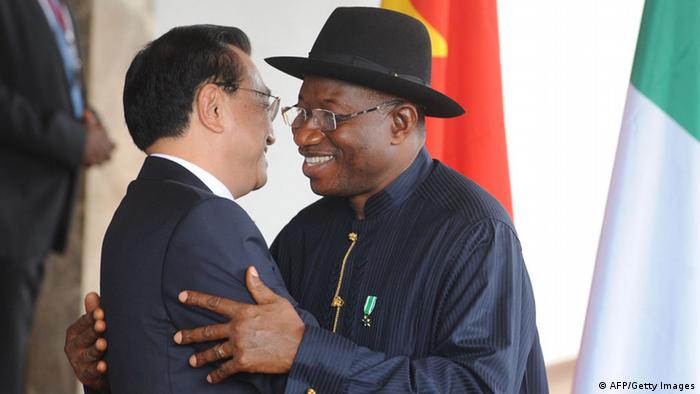
To date there has been no verifiable information about the girls' whereabouts. All that is known comes from a video message by Boko Haram leader, Abubakar Sheakau who threatened: "I will sell them as slaves on the market."
Political calculation or denying reality?
"Either he is not aware of what is going on," says Hussaini Abdu, from Nigerian NGO Action Aid, a group committed to good governance in the country. "Or, he's being, or the people around him are being, mischievous about the situation, or he is in total denial of the state of insecurity in the country. Or both."
Equally as shambolic was the government's information policy in relation to the missing school girls. Immediately following the kidnapping, the department said the military had freed the girls. After that, the government was forced to admit they had no information on the whereabouts of the students. Members of the government in the meantime have even denied the abduction took place at all. The president's wife, Patience Jonathan, accused some members of faking the abduction in a bid to harm the government.
Does Jonathan have the military under control?
President Jonathan hails from the prosperous south, he has no idea about the backward and impoverished north, says journalist and Nigeria expert Heinrich Bergstresser. Jonathan delegated the issue to his advisory and the military. "Therefore it is no surprise he says such strange things like he did last Sunday on television. These are strange worlds for him. It's something he has never had anything to do with and something he doesn't want anything to do with," says Bergstresser.
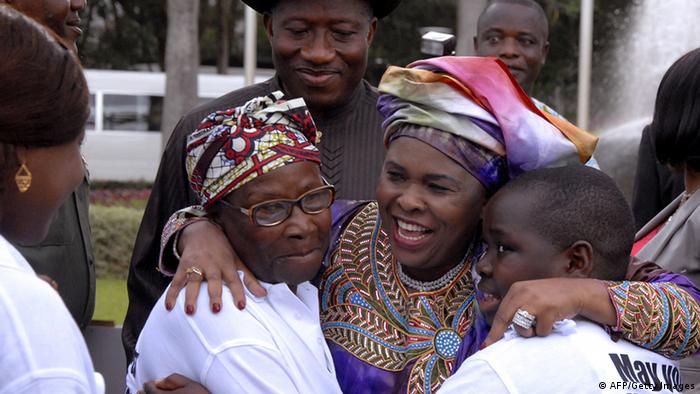
Many Nigerian's are also wondering if President Jonathan has the military under control. In Borno state, where the girls were kidnapped from, and the recent massacre occurred, a state of emergency has been in place for the past year. How could Boko Haram kidnap the girls from under the military's nose? "The way Boko Haram has been performing terrorist attacks shows that competent security forces must be involved," says Bergstresser. Several military personnel have already been sentenced by a military court for collaborating with Boko Haram.
"Corrupt military"
Nigeria invested a fifth, about 4.3 billion euros ($5.9 billion), of its national budget on the security apparatus. Some members of the military make good money, says Bergstresser. "Cautious estimates suggest about 2.8 billion euros go directly into the pockets of the top people in politics, the military and the police – only a small portion is used to fight the terrorists." Military leaders have no interest in ending the conflict.
Political scientist Hussaini Abdu refers to the many decades of military dictatorship Nigeria has behind it. "The military has been in power in Nigeria for more than 35 years. Therefore, a particular military culture has developed over the years, the political leadership of the country is still struggling to control the military or the civil control of the armed forces is still relatively weak."
Some also suspect President Jonathan's political opponents in the north east are working with Boko Haram. In the past few weeks such accusations have been running rife. For Abdu, the answer is simple: "Even if politicians are arranging such a thing, the military, the intelligence committee, should be able to find that out and actually stop it. Unless, of course, the government does not have complete control over the military and the region." And that, Abdu says "is an indictment of your leadership."
Date 07.05.2014
Author Katrin Matthaei / jlw
Editor Robin Eberhardt
Source: Deutsche Welle
Oklahoma execution: inmate dies 43 minutes after failed lethal injection
- Details
- Category: Current Issues
- Created on Wednesday, 30 April 2014 00:00
- Hits: 3798
 Oklahoma execution: inmate dies 43 minutes after failed lethal injection
Oklahoma execution: inmate dies 43 minutes after failed lethal injection
Link to video: Botched execution leaves Oklahoma inmate 'tortured to death'
• State calls off second execution after failure of first
• Untested cocktail of drugs fails to kill Clayton Lockett
• Execution halted after 16 minutes, inmate dies later
Katie Fretland in McAlester, Oklahoma
The state of Oklahoma botched one execution and was forced to call off another on Tuesday when a disputed cocktail of drugs failed to kill a condemned prisoner who was left writhing on the gurney.
After the failure of a 20-minute attempt to execute him, Clayton Lockett was left to die of a heart attack in the execution chamber at the Oklahoma state penitentiary in McAlester. A lawyer said Lockett had effectively been "tortured to death".
For three minutes after the first drugs were delivered Lockett struggled violently, groaned and writhed, lifting his shoulders and head from the gurney.
Some 16 minutes after the execution began, and without Lockett being declared dead, the blinds separating the chamber from the viewing room were closed. The process was called off shortly afterwards. Lockett died 43 minutes after the first executions drugs were adminsitered.
The execution of Charles Warner, scheduled for 8pm local time, was then postponed. Both were due to have been carried out with a drug cocktail using dosages never before tried in American executions.
Lockett, 38, was convicted of the killing of 19-year-old, Stephanie Neiman, in 1999. She was shot and buried alive. Lockett was also convicted of raping her friend in the violent home invasion that lead to Neiman's death.
Warner, 46, was found guilty of raping and killing 11-month-old Adrianna Waller in 1997. He lived with the child's mother.
Death penalty states have scrambled to find new execution methods after drugs companies opposed to capital punishment, mostly based in Europe, withdrew their supplies.
Oklahoma decided to lethally inject Lockett and Warner with midazolam, a powerful sedative and anti-seizure drug that also induces amnesia, followed by vecuronium bromide and potassium chloride. Florida has used a similar method but it employed a dose of midazolam five times greater. Ohio used midazolam alongside a different drug, hydromorphone, in the January execution of Dennis McGuire, which took more than 20 minutes.
The grim outcome on Tuesday in Oklahoma appeared likely to fuel the debate over the death penalty in the US, in particular the use of these untested drugs combinations.
Madeline Cohen, an attorney for Warner, condemned the way Lockett was killed. "After weeks of Oklahoma refusing to disclose basic information about the drugs for tonight's lethal injection procedures, tonight Clayton Lockett was tortured to death," she said.
Richard Dieter, the executive director of the Death Penalty Information Center, which monitors capital punishment, said: "This could be a real turning point in the whole debate as people get disgusted by this sort of thing.
"This might lead to a halt in executions until states can prove they can do it without problems. Someone was killed tonight by incompetence," he told the Associated Press.
Before the attempted executions in Oklahoma, corrections spokesman Jerry Massie said they would probably take longer than normal because the first drug was expected to work more slowly. "Don't be surprised," Massie said.
The Guardian watched as Lockett was asked if he had final words. He said "no." He lay covered in a white sheet when the execution began at 6.23pm. At 6.30pm he was found to be still conscious.
Lockett was then pronounced unconscious at 6.33pm but his violent struggle began three minutes later. He tried to speak and was heard to say "man" at 6.39pm. An official in the execution room then lowered the blinds so viewers could no longer witness the process.
Robert Patton, the director of Oklahoma's department of corrections, said later that when doctors felt that the drugs were not having the required effect on Lockett, they discovered that a vein had ruptured. "After conferring with the warden, and unknown how much drugs went into him, it was my decision at that time to stop the execution," Patton told reporters.
Massie said that all three drugs in the cocktail used by the state were administered, but that a vein "blew" during the execution process and Lockett later suffered a heart attack. He was pronounced dead at 7.06pm, 43 minutes after the process began.
The execution of Charles Warner was postponed for 14 days.
[Oklahoma Execution Duration Graph Missing]]
The double executions were scheduled after an unprecedented legal and political dispute in Oklahoma. The inmates challenged the secrecy surrounding Oklahoma's source of lethal injection drugs, winning at the state district court level, but two higher courts argued over which could grant a stay of execution.
When the state supreme court stayed their executions so that it could consider their constitutional claim, the Republican governor, Mary Fallin, declared in a controversial statement that it had no authority to grant the stay. A member of the Oklahoma House of Representatives said he would try to have the justices who wanted the stay impeached. Amid accusations of undue political pressure, the court then ruled against the prisoners and lifted the stay.
On Tuesday night Fallin said she had directed her officials to conduct an investigation. "I have asked the department of corrections to conduct a full review of Oklahoma's execution procedures to determine what happened, and why, during this evening's execution of Clayton Derrell Lockett," she said in a statement. "I have issued an executive order delaying the execution of Charles Frederick Warner for 14 days to allow for that review to be completed."
Susanna Gattoni and Seth Day, attorneys for Lockett and Warner, said Lockett's execution demonstrated the harm caused by secrecy surrounding the drugs used in the attempted executions.
"This is exactly why we fought so hard to get this information known not just for our clients but for everyone," said Gattoni. " This shouldn't be kept secret. This is unfortunately what happens."
"There will be a next step," Day said. "Whatever it is there will be a next step."
Cohen, Warner's attorney, said no executions should proceed in Oklahoma in light of Lockett's execution. "My feeling about this is there can be no more executions in Oklahoma until there is a full investigation into what went wrong, an autopsy by an independent pathologist and full transparency about this process including the drugs," Cohen said.
Source: The Guardian UK
South Sudan peace talks resume as UN investigates mass killings
- Details
- Category: DateLines
- Created on Wednesday, 30 April 2014 00:00
- Hits: 4428
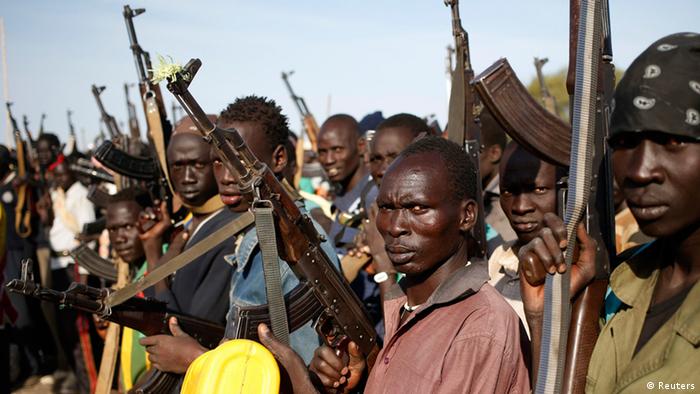 South Sudan peace talks resume as UN investigates mass killings
South Sudan peace talks resume as UN investigates mass killings
Peace talks between South Sudan's warring parties have resumed in Addis Ababa, while UN human rights chief Navi Pillay has arrived in Juba amid growing concern over the atrocities being committed in the war-torn country.
Peace talks aimed at ending four months of fighting in South Sudan resumed in the Ethiopian capital Addis Ababa on Monday (28.04.2014), the Intergovernmental Authority on Development (IGAD), the regional bloc mediating in the conflict, said in a statement.
Last week's decision by the South Sudanese government to release four high-ranking political prisoners accused of plotting a coup against President Kiir's government has raised hopes of an agreement. "I think it's quite significant that the justice minister said it's for the sake of peace and reconciliation," Ahmed Soliman, a research associate at Chatham House in London told DW. "There's increasing pressure on the government and also on the SPLM in opposition, who are continuing to fight on the battlefield in Upper Nile state," he added.
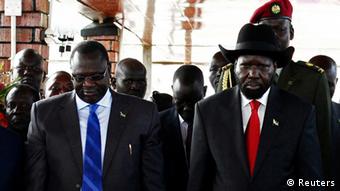 "This could have some repercussions in terms of defusing some of the tension and moving the political side of the negotiations in Addis Ababa forward."
"This could have some repercussions in terms of defusing some of the tension and moving the political side of the negotiations in Addis Ababa forward."
Cease-fire deal disregarded
The talks began shortly after the conflict had broken out in mid-December in the course of a power struggle between Kiir and ex-vice president Riek Machar. A ceasefire signed in late January has not stopped the fighting, which has been intensifying in recent weeks. Both sides have been implicated in massacres, rapes, attacks on UN bases sheltering civilians from the violence, and the recruitment of child soldiers.
Almost 200 people were killed in the northern town of Bentiu earlier this month.
Amid rising global concern over these atrocities, UN High Commissioner for Human Rights Navi Pillay and the UN's special envoy for the prevention of genocide, Adama Dieng, arrived in the capital Juba on Monday for meetings with President Salva Kiir and other senior officials.
UN human rights chief Navi Pillay is due to travel to massacre sites in South Sudan
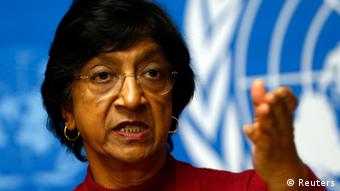 They are also due to travel to massacre sites "if security conditions allow", Joe Contreras, a spokesman for the UN Mission in South Sudan, said.
They are also due to travel to massacre sites "if security conditions allow", Joe Contreras, a spokesman for the UN Mission in South Sudan, said.
Warnings of genocide
Kenyan President Uhuru Kenyatta has warned of a possible genocide in South Sudan. In an interview with DW's AfricaLink program, Rupert Colville, the spokesperson for Navi Pillay, said that although he thought it was premature to call it genocide, the continued ethnic killings, including the particularly horrific massacre in Bentiu, and the recent "hate radio" messages were definitely strong warning signs.
"It's very dangerous, that's for sure," Colville said. "And I think the mere fact that the special advisor to the secretary-general for the prevention of genocide, Adama Dieng, is here with us, an indicator of that."
(dpa, AFPE, AFP)
Date 28.04.2014
Author Monika Guarino (dpa, AFP)
Editor Chrispin Mwakideu
Source: Deutsche Welle
Global Witness: 'Environmentalist murders escalating worldwide'
- Details
- Category: The World
- Created on Wednesday, 23 April 2014 00:00
- Hits: 4834
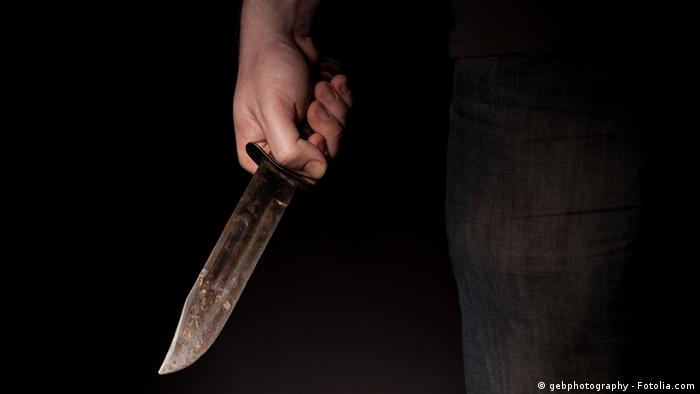 Global Witness: 'Environmentalist murders escalating worldwide'
Global Witness: 'Environmentalist murders escalating worldwide'
There has been a sharp increase in violence against environmental activists around the world, according to a new report from Global Witness. Brazil and Cambodia are among the countries worst affected by the problem.
Competition for access to natural resources is intensifying as the global population grows and consumer waste forces up demand. This has placed enormous pressure on the world's forests and other natural areas. A battle has broken out between conservationists and corporations with competing interests.
Rights group Global Witness has been monitoring the violence and in a new report, they reveal that nearly a thousand people have been killed in the past decade. Oliver Courtney, a senior campaigner with Global Witness, discussed his findings with DW.
DW: Where are we seeing an increase in violence?
Oliver Courtney: This is a global problem. But Latin America and Asia Pacific are two regions particularly hard hit by this problem.
Why are people being attacked?
Ordinary people are coming into conflict when they oppose the sale or taking of their land for large scale natural resource projects. The key drivers are the expansion of industrial logging trade, land grabs by agribusiness and mining projects.
We are seeing deals being done behind closed doors. Large scale resource deals for land that belongs to local people or that people have lived on for generations. This land is being taken off them without their consent, without consulting them. When they object, they are forcibly ejected from their land – often with fatal consequences, as we are seeing here.
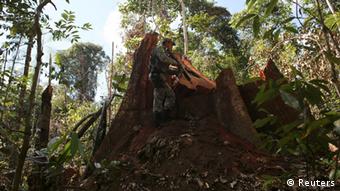 One of the more shocking cases is from Brazil where prominent activists, Jose Claudio Ribeiro da Silva and his wife, were shot by masked gunmen in an ambush near the reserve where they'd been producing nuts and natural oils for the past 24 years. They had been protesting against the expansion of logging operations in the reserve where they lived and in the Amazon. Jose Claudio had one of his ears ripped off by the killers as proof of his execution.
One of the more shocking cases is from Brazil where prominent activists, Jose Claudio Ribeiro da Silva and his wife, were shot by masked gunmen in an ambush near the reserve where they'd been producing nuts and natural oils for the past 24 years. They had been protesting against the expansion of logging operations in the reserve where they lived and in the Amazon. Jose Claudio had one of his ears ripped off by the killers as proof of his execution.
Global Witness started researching this issue when Chuck Witty - a prominent Cambodian forest activist - was murdered in 2012 in Cambodia by military police. Shortly after his death a 14-year-old girl was killed in a forced eviction from a village in Cambodia, again by military police. This speaks to a history of the Cambodian government selling off the country's land, forest and other resources in deals behind closed doors to unscrupulous companies. People lose out, the environment loses out and a very small elite gain.
What kind of reaction is there from the police and the courts?
There is very little information available about perpetrators. Less than one percent of the killers in the 908 cases that we found have been brought to justice. It's terrible – it's particularly terrible for the families of the victims. It also has a knock-on effect in terms of silencing dissent and hampering environmental activism further.
These are people who we feel should be celebrated as heros and held up and supported by their governments. Instead, it appears they are not getting the protection they deserve. In some cases the governments are actively colluding with those responsible for the violence.
What impact does it have on a society and its natural resources when conservationists are killed or injured for speaking out?
These are the resources that belong to those people. It's very important that they are used in a sustainable way and that the people who live on the land and relied on it for generations have some say in how its managed. And if it is to be exploited, they should see some of the benefits.
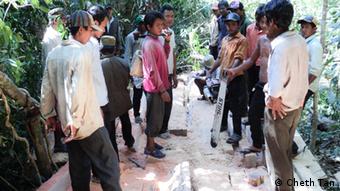 When they oppose such operations and they face violence or a fatal threat as a result, obviously that has a massively chilling effect on their efforts to protect the environment and it does hamper activism . It certainly means that the resource trade in general is one which serves the interests of a small minority – a powerful minority – rather than the greater good.
When they oppose such operations and they face violence or a fatal threat as a result, obviously that has a massively chilling effect on their efforts to protect the environment and it does hamper activism . It certainly means that the resource trade in general is one which serves the interests of a small minority – a powerful minority – rather than the greater good.
It's also not good for the planet as a whole that these resources are being sold off wholesale behind closed doors in deals which benefit a few and don't serve the interests of the wider planet.
This violence is being seen in developing nations and emerging economies. But in other reports, you've said the violence is spurred on by a spike in global consumption. So, really, the richest nations in the world are connected to this problem. Can you explain?
What is driving a lot of the competition for resources behind this rise in killings is consumption. Soaring, wasteful consumption of products like timber. Commodities like soya and rubber and other things which we use all the time in everyday products. The demand for that is increasing as populations grow, and countries develop further. It's simply not sustainable. We're stretching the planet beyond its limits and this is one of most obvious symptoms of that happening.
There really needs to be a rethink about how resources are used. How they're allocated on a national and international level.
 What are you hoping to achieve with the release of this report?
What are you hoping to achieve with the release of this report?
Environmental activists need to be protected and what is happening to them needs to be monitored. Not nearly enough attention is being paid to this problem. We want to see governments monitor the problem, protect their citizens, and make sure those responsible for environmental crimes are brought to justince. The UN human rights council should pass a resolution specifically addressing the plight of environmental and land defenders.
We also think companies have a role to play. They have to check their supply chain to make sure they have nothing to do with this violence. That they aren't operating in militarized areas and that they can be held accountable for how their purchasing policies are affecting everyday people. These acitivists, these people, are on the frontlines of the global land grab.
Courtney Oliver is a senior campaigner with Global Witness, which has just published the report 'Deadly Environment: The rise in killings of environmental and land defenders'.
Date 15.04.2014
Author Interview: Saroja Coelho
Editor André Leslie
Source: Deutsche Welle


